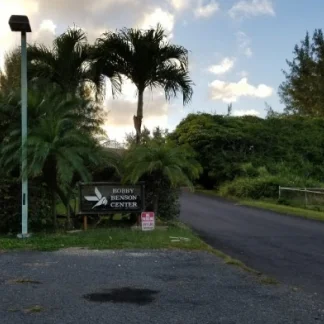Hina Mauka Teen Care - Kahuku High School
Hina Mauka Teen Care - Kahuku High School offers outpatient treatment for indivi...
Bobby Benson Center, located in Kahuku, Hawaii, offers alcohol and drug rehab programs and dual diagnosis treatment to men and women seeking recovery. Their levels of care are designed to meet individuals where they are on their recovery journey.
Bobby Benson Center is a person-centered treatment facility. Their programs include residential treatment, intensive outpatient programs (IOP), and standard outpatient treatment.
Residential Treatment The residential treatment program is a high intensity program for those who need 24/7 care. Treatment includes trauma-informed care. Individual therapy, group therapy, and psychoeducational classes are available.
Intensive Outpatient Program The intensive outpatient program meets for six hours per week for adolescents and nine hours per week for adults. Each person receives a personalized treatment plan. Mental health treatment, educational programs, and self-help classes are provided.
Outpatient Treatment The outpatient program is for those who would benefit from meeting with a mental health counselor one time per week. Self-help classes such as the 12 Steps and SMART are available.
Contact us for more information: (808) 293-7555

Connect with Bobby Benson Center by calling their admissions team directly.
(808) 293-7555 Website Get DirectionsResearch clearly demonstrates that recovery is far more successful and sustainable when loved ones like family members participate in rehab and substance abuse treatment. Genetic factors may be at play when it comes to drug and alcohol addiction, as well as mental health issues. Family dynamics often play a critical role in addiction triggers, and if properly educated, family members can be a strong source of support when it comes to rehabilitation.
Group therapy is any therapeutic work that happens in a group (not one-on-one). There are a number of different group therapy modalities, including support groups, experiential therapy, psycho-education, and more. Group therapy involves treatment as well as processing interaction between group members.
Trauma therapy addresses traumatic incidents from a client's past that are likely affecting their present-day experience. Trauma is often one of the primary triggers and potential causes of addiction, and can stem from child sexual abuse, domestic violence, having a parent with a mental illness, losing one or both parents at a young age, teenage or adult sexual assault, or any number of other factors. The purpose of trauma therapy is to allow a patient to process trauma and move through and past it, with the help of trained and compassionate mental health professionals.
Group therapy is any therapeutic work that happens in a group (not one-on-one). There are a number of different group therapy modalities, including support groups, experiential therapy, psycho-education, and more. Group therapy involves treatment as well as processing interaction between group members.
Trauma therapy addresses traumatic incidents from a client's past that are likely affecting their present-day experience. Trauma is often one of the primary triggers and potential causes of addiction, and can stem from child sexual abuse, domestic violence, having a parent with a mental illness, losing one or both parents at a young age, teenage or adult sexual assault, or any number of other factors. The purpose of trauma therapy is to allow a patient to process trauma and move through and past it, with the help of trained and compassionate mental health professionals.
Trauma therapy addresses traumatic incidents from a client's past that are likely affecting their present-day experience. Trauma is often one of the primary triggers and potential causes of addiction, and can stem from child sexual abuse, domestic violence, having a parent with a mental illness, losing one or both parents at a young age, teenage or adult sexual assault, or any number of other factors. The purpose of trauma therapy is to allow a patient to process trauma and move through and past it, with the help of trained and compassionate mental health professionals.
Hina Mauka Teen Care - Kahuku High School offers outpatient treatment for indivi...
North Shore Mental Health is a private rehab located in Kahuku, Hawaii. North Sh...